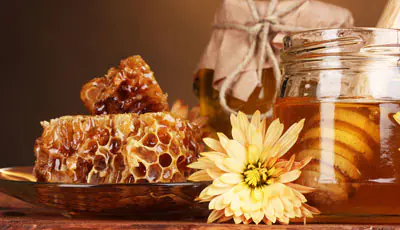Bee honey is one of the most ancient products on Earth and is extremely popular all over the world due to its healing properties and unique taste. However, in addition to its beneficial properties, honey also has some disadvantages that should be taken into account when consuming it.
Composition of honey
Honey consists primarily of sugars (glucose, maltose, sucrose, levulose), which make up about 78% of the product. Water in honey is present at a level of 20%, and mineral salts at a level of 2%. However, in addition to this, honey also contains trace elements such as iodine, iron, potassium, calcium, phosphorus and magnesium, as well as vitamins B2 and B6, folic and pantothenic acids.
The benefits of honey
Honey is known to have powerful antiviral, antibacterial and antifungal properties, which make it very useful in treating burns, cuts and wounds. Honey is also an effective antiseptic and helps improve blood quality by preventing free radicals from spreading.
Honey can be beneficial for people with diabetes as it replaces sugar that is harmful to them. In addition, honey is useful for colds, as it relieves nasal congestion, treats coughs and improves digestion.
In addition, honey improves human immunity due to its high content of amino acids, which normalize metabolism. It is also an excellent cosmetic product and is used as an ingredient in various cosmetic preparations.
Harm of honey
However, in addition to its beneficial properties, honey also has some disadvantages. First, honey is a strong allergen, so people with allergies should avoid consuming it. Also, people suffering from diabetes should consume honey with caution.
Some people may also experience honey intolerance, although such cases are quite rare. Honey heated at high temperatures loses its healing properties and becomes just sweet molasses. Finally, excessive consumption of honey can lead to the development of obesity, as it contains calories that promote the accumulation of fat deposits.
How to use honey correctly
To obtain the beneficial properties of honey, it should be consumed in moderation. It is recommended to consume no more than 1-2 tablespoons of honey per day. When choosing honey, you should pay attention to its quality and origin. It is best to choose honey from trusted producers who do not use chemical additives or pesticides in production.
Honey can be added to tea, yogurt, breakfasts and other dishes instead of sugar. It can also be used as an ingredient in various culinary recipes. When using honey for cosmetic purposes, it should be applied to the skin as a mask or added to cosmetic products such as creams and lotions.
Conclusion
Bee honey is a unique product that has many beneficial properties for humans. However, when consuming it, you should be aware of some disadvantages and use honey in moderation. Proper use of honey will help you obtain all its beneficial properties and avoid possible negative consequences.



